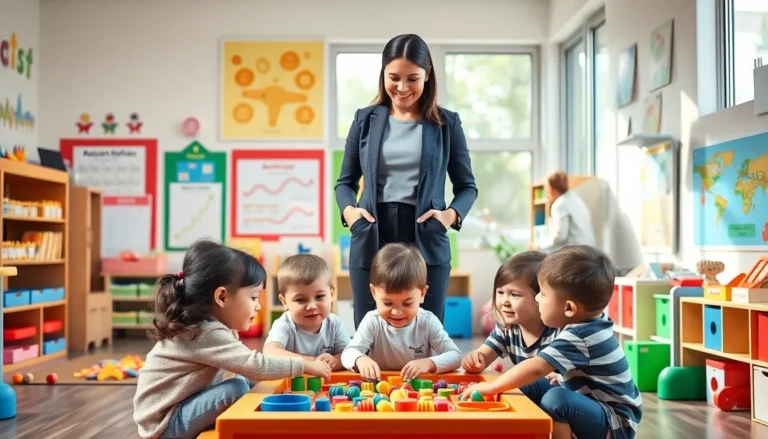Table of Contents
ToggleDeciding when to send kids to preschool can feel like choosing the right avocado at the grocery store—too early and it’s hard as a rock, too late and it’s mushy. Parents often wonder if their little ones are ready to trade in their playtime for a classroom full of crayons and snack time. The truth is, there’s no one-size-fits-all answer, but understanding the signs of readiness can make the decision a little less daunting.
Understanding Preschool
Preschool serves as an early educational experience designed for children typically aged 3 to 5 years. This environment fosters social skills, emotional development, and introductory academic concepts. Developing a routine in preschool helps children transition smoothly to more structured education.
The curriculum in preschool focuses on play-based learning. Activities such as storytelling, art projects, and group play encourage creativity and problem-solving. Engaging in these activities allows children to explore their interests while forming early learning foundations.
Key benefits of preschool include enhanced social interactions. Children learn essential skills, such as sharing, cooperation, and communication through guided play. Strong socialization prepares them for future school environments, where collaboration becomes crucial.
Parental involvement remains critical during preschool years. Communicating with teachers helps parents stay informed about their child’s progress and development. Understanding preschool activities can foster interest and support at home.
Recognizing signs of readiness is essential for parents. Indicators such as curiosity about learning, ability to follow simple instructions, and comfort with separation from caregivers can guide this decision. Preschool serves not only as a place for learning but also as a stepping stone toward future academic success.
Choosing the right preschool adds to the overall experience. Parents should consider factors like location, teacher qualifications, and learning philosophies. These elements contribute significantly to children’s positive experiences during their formative years.
Benefits of Preschool
Preschool offers numerous advantages that significantly contribute to children’s early development. Children engage in diverse learning experiences that equip them with essential skills.
Cognitive Development
Cognitive growth occurs rapidly during preschool years. Curriculums often include age-appropriate activities that promote critical thinking and problem-solving. For instance, block building enhances spatial awareness while math games introduce basic numeracy concepts. Language skills also flourish as children sing songs, participate in storytelling, and converse with peers. Exposure to new vocabulary encourages language acquisition and comprehension. Schools often use structured curricula designed to foster curiosity and creativity, laying a strong foundation for lifelong learning.
Social Skills
Preschool plays a crucial role in developing social skills. Interacting with peers helps children learn to share, take turns, and cooperate. Group activities often promote teamwork and communication, critical elements in social settings. Conflict resolution becomes a part of play as children navigate disagreements and learn to express their feelings. Guided by teachers, children build empathy and respect for others, skills that benefit them in future relationships. Engaging with diverse groups enhances cultural awareness and acceptance, fostering inclusivity.
Factors Influencing Start Age
Several factors impact the appropriate age for children to start preschool. These include the child’s readiness and various family considerations.
Child’s Readiness
A child’s readiness for preschool encompasses social, emotional, and cognitive aspects. Signs of curiosity about learning often indicate that a child is prepared for more structured environments. Comfort with being away from caregivers plays a significant role as well. Children displaying the ability to follow simple instructions and engage in group activities exhibit readiness. Emotional maturity can also affect how well a child adapts to preschool, with those showing resilience and flexibility doing better in early learning settings.
Family Considerations
Family dynamics heavily influence the decision about when to send a child to preschool. Parents’ work schedules can dictate the timing, especially for dual-income households. Additionally, siblings’ ages and experiences might significantly impact the decision. Some families may prioritize early education, valuing the social interactions and cognitive benefits that preschool provides. Others may prefer to delay enrollment based on personal beliefs or the desire for additional time at home. Each family’s unique situation shapes the decision about when a child should start preschool.
Common Starting Ages
Parents often consider various starting ages for preschool when planning their child’s education. A child’s readiness and family dynamics can guide this decision.
Traditional Start Age
The traditional start age for preschool usually falls between 3 and 4 years. Many programs are designed for children who turn 3 before September, allowing them to enroll that same year. Most preschoolers attend until they reach 5 years old, transitioning into kindergarten afterward. At this age, children typically exhibit greater curiosity, social skills, and emotional readiness, making it easier for them to adapt to a structured setting. Additionally, teachers expect a degree of independence, such as the ability to separate from caregivers and follow basic instructions.
Alternative Options
Some families may explore alternative options, considering enrollment at ages younger than 3 or older than 4. Certain preschools offer programs for toddlers starting at 2 years and 6 months. These programs often focus on socialization and early developmental skills through play. For older children, some parents prefer enrolling in part-time programs if family schedules or other commitments affect full-time attendance. Alternative approaches cater to individual needs, supporting varied family situations while fostering learning.
Deciding when to start preschool is a pivotal moment for both children and parents. By recognizing signs of readiness and considering family dynamics, parents can make informed choices that align with their child’s needs. The right preschool experience can significantly impact a child’s social and cognitive development, setting the stage for future learning.
Whether a child begins at age three or a bit later, the focus should always be on fostering a supportive environment that nurtures curiosity and emotional growth. Ultimately, each child’s journey is unique, and finding the right timing will lead to a positive preschool experience.







